|
|
|
Sort Order |
|
|
|
Items / Page
|
|
|
|
|
|
|
| Srl | Item |
| 1 |
ID:
133716
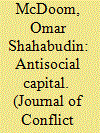

|
|
|
|
|
| Publication |
2014.
|
| Summary/Abstract |
Although popularly perceived as a positive force important for objectives such as economic development and democracy, social capital may also be linked to less desirable outcomes. This article highlights a dark side to social capital by pointing to its role in a particularly pernicious phenomenon: genocidal violence. Drawing on a survey of residents from one community that experienced violence during Rwanda's 1994 genocide, I show that individual participation in the violence was partly determined by the features of residents' social networks. Perpetrators possessed larger networks in general and more connections to other perpetrators in particular. The quality as well as quantity of connections also mattered. Strong ties generally, and kinship and neighborly ties specifically, were strong predictors of participation. In contrast, possession of countervailing ties to nonparticipants did not reduce a resident's likelihood of participation. Drawing on in-depth interviews to explore the possible mechanisms behind these findings, I suggest participants' networks fulfilled functions of information diffusion, social influence, and behavioral regulation. More broadly, the findings suggest the importance of social structure and social interaction for participation in collective violence. Relational data should complement individual attribute data in predicting participation. The findings also suggest, contrary to the neo-Malthusian interpretation, that the role played by Rwanda's extraordinarily high population density in the violence may have been more sociological than ecological in origin. The diffusion, influence, and regulatory effects of social connections are likely to be amplified in communities where individuals live in close spatial proximity to each other.
|
|
|
|
|
|
|
|
|
|
|
|
|
|
|
|
| 2 |
ID:
143445
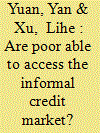

|
|
|
|
|
| Summary/Abstract |
The poor are often excluded from formal credit markets, but few empirical studies in literature have investigated whether the poor are constrained in the informal credit market. This paper uses recent micro data of rural China to answer this question. An instrumental variable model is estimated to account for potential endogeneity issues. Results show that poorer households have lower probability of entering the informal credit market. Further examination shows that the poor are limited by social network and that they have no financial means to invest in their social capital to expand their social network. Our findings shed light on potential solutions of reducing poverty in rural areas.
|
|
|
|
|
|
|
|
|
|
|
|
|
|
|
|
| 3 |
ID:
155240
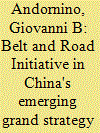

|
|
|
|
|
| Summary/Abstract |
As Chinese leaders endeavor to maintain the international environment aligned with their strategic aim of realizing the “dream of national rejuvenation,” the remarkable increase in China's capabilities, coupled with uncertainty in the global economy and the ambivalent attitude of the USA toward the international order, poses fresh challenges to Beijing's foreign policy. The present paper argues that a lexicographic preference for the mitigation of the risk of pushback against China's core interests underpins the Belt and Road Initiative. Pursuing a strategy of credible reassurance commensurate to the shift in the distribution of power in China's neighborhood and globally, President Xi Jinping's administration has been cultivating a form of connective leadership that commits China to the encapsulation of the Belt and Road Initiative for transregional connectivity into its own national development strategy, generating an octroyé, non-hegemonic, type of international social capital, and integrating the existing order without corroborating the position of its founder.
|
|
|
|
|
|
|
|
|
|
|
|
|
|
|
|
| 4 |
ID:
099781
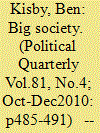

|
|
|
|
|
| Publication |
2010.
|
| Summary/Abstract |
The Prime Minister, David Cameron, recently set out his vision of a 'big society'. Its core themes are empowering communities, redistributing power from the state to citizens and promoting a culture of volunteering. The idea is badly flawed. It overlooks the crucial role that needs to be played by the state in promoting social justice, which is vital to the development of active citizenship and vibrant communities. Moreover, Cameron views the active citizen as simply a philanthropist and volunteer rather than as a politically literate individual, knowledgeable about the major political issues of the day and actively involved in debates about how public or private services ought to be run. The initiative is particularly perverse in the context of the credit crunch, a vitally important cause of which was precisely not the development of an over-mighty state but rather the inadequate state regulation of free market trading activities by banks.
|
|
|
|
|
|
|
|
|
|
|
|
|
|
|
|
| 5 |
ID:
086740


|
|
|
|
|
| Publication |
2009.
|
| Summary/Abstract |
The discourse on the integration of ethnic minorities in the Netherlands has undergone profound changes over the past few decades. This article analyses how discourses in politics and academia have revolved around changing emphases upon the social capital processes of 'bonding' of individuals within groups and 'bridging' of individuals to the wider society. Four episodes of discourse and policy may be distinguished: denial of being a country of immigration until the 1970s; the Minorities Policy in the 1980s; the Integration Policy of the 1990s; and the rise of a more assimilationist discourse after the turn of the millennium. The country thus began in the post-war period with a pluralist perspective toward integration rooted in the traditional religious and ideological 'pillarisation' of society, shifting first to a multicultural perspective, then to an integrationist and, finally, in the new millennium, to an assimilationist perspective.
|
|
|
|
|
|
|
|
|
|
|
|
|
|
|
|
| 6 |
ID:
141472


|
|
|
|
|
| Summary/Abstract |
In April 1984, 25 members of the Jewish Underground were arrested by the Israeli General Security Service moments after they had planted explosives in five Palestinian-owned buses. Their arrest and sentencing brought to an end one of the more sophisticated expressions of Jewish terrorism since the birth of Israel. Overall, the group planned four operations, one of which was the conspiracy to bomb the Muslim holy sites on the Temple Mount. As we outline below, social links between the members of the Jewish Underground significantly facilitated the creation of this organization. We demonstrate that social capital, here expressed in terms of networks, trust, and norms – which are widely considered important components of a healthy democracy – can take a negative turn toward participation in terrorism.
|
|
|
|
|
|
|
|
|
|
|
|
|
|
|
|
| 7 |
ID:
169144
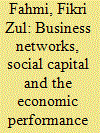

|
|
|
|
|
| Summary/Abstract |
This study examines the ways in which networking characteristics and practices influence the economic performance of creative and cultural industries. The notion of social capital is used to conceptualise the complex nature of networks, including both professional and social relationships that occur on multiple levels. This qualitative study is set in the context of Indonesia, in which two cases are examined: creative apparel entrepreneurs in Bandung and batik producers in Surakarta. The results show that regional environments provide opportunities for creative industries to find specialist suppliers, to gather market information and, importantly, to find and cross‐fertilise new ideas. Although regions provide these opportunities, the firms’ internal social capital is crucial in being able to internalise and transform the knowledge from the environment into innovative values embodied in their products.
|
|
|
|
|
|
|
|
|
|
|
|
|
|
|
|
| 8 |
ID:
128206


|
|
|
|
|
| Publication |
2014.
|
| Summary/Abstract |
International migration and diaspora has been one of the integral parts of the recent development discourse in academics as well as the policy domain, especially in the context of developing countries. Diaspora is seen as one of the emerging development actors as diaspora is perceived as creating economic, social and political capital through global network (Gaillard 1991, Meyer Brown 1999). Multilateral organizations have taken note of the significance of diasporic contribution towards the global development.
|
|
|
|
|
|
|
|
|
|
|
|
|
|
|
|
| 9 |
ID:
166620
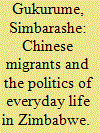

|
|
|
|
|
| Summary/Abstract |
While there has been a rapid migration of Chinese nationals to Zimbabwe following the ‘Look East’ policy, there has been little research on and about how the Chinese migrants relate and interact with locals and how they negotiate their social identities thereof. This paper examines Chinese small-scale traders in Harare, in particular their mundane forms of the everyday, with specific focus on their social and business practices, social relations and interactions with the locals. Drawing on qualitative ethnographic research with small-scale Chinese traders, workers and clients in Harare, this paper argues that as Chinese traders devise and deploy various tactics and strategies to adapt and get-by in the city of Harare, new and unique forms of Chineseness emerge akin to what some scholars referred to as ‘tactical cosmopolitanism’. The paper further reveals how Chinese mobility reconfigures the ways in which Chinese identities and Chineseness are enacted and articulated in Harare.
|
|
|
|
|
|
|
|
|
|
|
|
|
|
|
|
| 10 |
ID:
192869
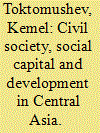

|
|
|
|
|
| Summary/Abstract |
There is a paradox of social capital in Central Asia. Despite the efforts of the international community to promote civil society in the region, Central Asia has one of the most restrictive environments for associational life. Accordingly, the main goal of this paper is to change discourses about civil society in Central Asia and call for more research on the impact of social capital on development outcomes. Development efforts should recognize that besides non-governmental organisations, other networks and associated norms of reciprocity can foster positive social capital for the transformation of the region.
|
|
|
|
|
|
|
|
|
|
|
|
|
|
|
|
| 11 |
ID:
159247
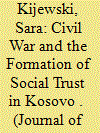

|
|
|
|
|
| Summary/Abstract |
While a new, growing subset of the literature argues that armed conflict does not necessarily erode social cohesion in the postwar era, we challenge this perspective and examine how civil war experiences shape social trust in Kosovo after the war from 1998 to 1999. Based on a nationwide survey conducted in 2010 and the disaggregated conflict event data set of the Armed Conflict Location & Event Data Project, we simultaneously analyze the impact of individual war-related experiences and exposure to war in the community through hierarchical analyses of twenty-six municipalities. Our findings confirm that civil war is negatively related to social trust. This effect proves to be more conclusive for individual war experiences than for contextual war exposure. Arguably, the occurrence of instances of violence with lasting psychological as well as social structural consequences provides people with clear evidence of the untrustworthiness, uncooperativeness, and hostility of others, diminishing social trust in the aftermath of war.
|
|
|
|
|
|
|
|
|
|
|
|
|
|
|
|
| 12 |
ID:
166738
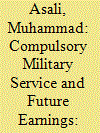

|
|
|
|
|
| Summary/Abstract |
Using Israeli census data, and the random assignment of Arab males to military service, this study provides new evidence on the long-term effects of military service on the earnings of veterans. Among Druze men, we find an economically and statistically significant positive effect of 23% on their wages. The unskilled experience a slightly higher premium. The positive effects are large and intensify over time. Skill enhancement and usual human capital accumulation do not explain the positive effect of military service. Networking during service is proposed as a likely explanation.
|
|
|
|
|
|
|
|
|
|
|
|
|
|
|
|
| 13 |
ID:
133702
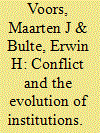

|
|
|
|
|
| Publication |
2014.
|
| Summary/Abstract |
The impact of armed conflict may persist long after the end of war, and may include a lasting institutional legacy. We use a novel dataset from rural Burundi to examine the impact of local exposure to conflict on institutional quality, and try to 'unbundle' institutions by distinguishing between three dimensions of the institutional framework: property rights security, local political institutions, and social capital. We find that conflict exposure affects institutional quality, and document that the impact of conflict on institutional quality may be positive or negative, depending on the institutional measure. Specifically, exposure to violence strengthens in-group social capital and promotes tenure security. However, the appreciation for state institutions is negatively affected by exposure to violence. We find no evidence consistent with design-based theories of institutional quality, or the idea that institutional quality is enhanced by interventions of (non)state external actors. Instead our findings provide some support for the theory of parochial altruism. Our results emphasize the importance for policymakers to consider autonomous responses to conflict when designing development programs. They further imply some caution for actors seeking to reform local institutions through top-down interventions.
|
|
|
|
|
|
|
|
|
|
|
|
|
|
|
|
| 14 |
ID:
113933
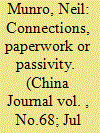

|
|
|
|
|
| Publication |
2012.
|
| Summary/Abstract |
The low degree of institutionalization of Chinese administration means that citizens engaging with the bureaucracy have a choice of strategies to achieve objectives. This article deploys Asia Barometer survey data from 2006 to construct a predictive model of preferences to obtain a government permit, including use of connections (guanxi), bribery, writing letters, waiting patiently, and the passive-pessimistic response "nothing can be done". It finds that strategy preference varies according to location (urban or rural interacting with region), socio-economic status, social capital, political values and political performance evaluations. The pattern of determinants shows that Chinese citizens are cross-pressured. The class and gender nature of guanxi and bribery are an obstacle to the creation of a modern Chinese state, but high levels of social trust, support for political freedom, the market and meritocracy combined with the reservoir of trust enjoyed by executive organs present a favourable climate for efforts to improve governance.
|
|
|
|
|
|
|
|
|
|
|
|
|
|
|
|
| 15 |
ID:
185959
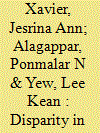

|
|
|
|
|
| Summary/Abstract |
This article examines the effect of academic qualifications and networking ties towards the evolvement of micro, small-medium, and large ethnic Indian enterprises in Malaysia. The study is based in multicultural Malaysia, where certain policies were implemented in favor of one specific ethnicity. Research indicates that better academic qualifications through transgenerational succession affect how entrepreneurs form connections with their families, co-ethnic networks, and inter-ethnic networks to develop their businesses. This article explains that while micro and smaller firms are choosing to remain in their ethnic identity, medium and larger corporations are willing to shed their ethnic identity for the rapid growth of their businesses. A framework is built from the understanding of literature and past evidence on ethnic Indian entrepreneurship in Malaysia. This article demonstrates the disparities of Malaysian Indian businesses that have progressed differently over the generations, due to the impact of human and social capital.
|
|
|
|
|
|
|
|
|
|
|
|
|
|
|
|
| 16 |
ID:
191319
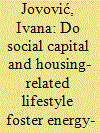

|
|
|
|
|
| Summary/Abstract |
This article explores the role of social capital and housing-related lifestyle in fostering energy-efficient retrofits and sheds additional light on potential barriers and drivers to energy-efficient retrofits in households. Using data from an online survey conducted in August 2020, a retrospective panel data set comprised of 2537 households from the EU member state of Slovenia is constructed. The results of discrete choice models with random effects show that high income levels, the respondent’s age, the age of the dwelling, previously performed retrofits, and the availability of subsidies are drivers, while high regional temperatures and negative GDP growth are barriers to energy-efficient retrofits. We find that social capital and housing-related lifestyle are also important determinants of energy-efficient retrofits. Certain dimensions of housing-related lifestyle, such as energy-saving behavior and a proclivity for ‘do-it-yourself’ home maintenance and repairs, act as drivers of energy-efficient retrofits. The same is true for variables related to social capital, namely, ease of agreement among residents and the formal organization of the building. A policy mix of further education and information campaigns, subsidies, and measures that affect the formal organization of the building and promote community building is required to address the various barriers to energy-efficient retrofits.
|
|
|
|
|
|
|
|
|
|
|
|
|
|
|
|
| 17 |
ID:
109761
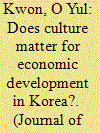

|
|
|
| 18 |
ID:
118530


|
|
|
|
|
| Publication |
2012.
|
| Summary/Abstract |
The dominant explanation of public attitudes vis-à-vis economic globalisation focuses on re-distributional implications, with an emphasis on factor endowments and government-sponsored safety nets (the compensation hypothesis). The empirical implication of these theoretical arguments is that in advanced economies, on which this article focuses, individuals endowed with less human and financial capital will be more likely to experience income losses. Hence they will oppose economic openness unless they are compensated by the government. It is argued here that including social capital in the analysis can fill two gaps in explanations relying on factor endowments and the compensation hypothesis. First, generalised trust - one key aspect of social capital - constitutes a personal endowment alongside human and financial capital. Second, structural social capital - another key aspect of social capital - can be regarded as a nongovernmental social safety net that can compensate for endowment-related disadvantages of individuals. Both aspects of social capital are expected to contribute, for distinct reasons, to more positive views on economic openness. The empirical testing relies on survey data for two countries: Switzerland and the United States. For both countries, the results indicate that generalised trust has a strong, positive effect on public opinion of economic globalisation, whereas structural social capital has no effect.
|
|
|
|
|
|
|
|
|
|
|
|
|
|
|
|
| 19 |
ID:
187803
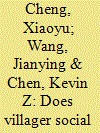

|
|
|
|
|
| Summary/Abstract |
Poor targeting performance is a common concern in the increasingly implemented decentralized targeted antipoverty programs in developing countries. Different from previous literature that focuses on targeting errors caused by elite capture, we explore the role of villager social capital as a whole in poverty targeting in the context of China's Targeted Poverty Alleviation (TPA) policy. The empirical analysis uses a unique census-type data from three administrative and seventeen natural villages in the poverty-stricken county in Western China in 2017. Villager social capital is measured by a proxy index by combing reciprocity, support time, gift expenses, and political connection of villagers. We verify that the villager with rich villager social capital is more likely to be a beneficiary of TPA by using instrumental variable estimation. The nonpoor can mobilize their higher level of social capital than the poor to capture the beneficiary quotas that should be allocated to the poor, resulting in mistargeting. Such effect persists after controlling political elite capture effects. The findings point out villager social capital is the root cause of poor targeting in decentralized targeting programs in rural China and also lend new support from China to the classic debate on social capital is not the capital of the poor.
|
|
|
|
|
|
|
|
|
|
|
|
|
|
|
|
| 20 |
ID:
155296
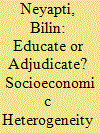

|
|
|
|
|
| Summary/Abstract |
I present a formal framework to explore the welfare and distributional effects of a government’s optimal choice over two types of public spending in a closed economy: domestic security (DS) and investment in social capital (SC). Production is characterized as a function of social and physical capital stocks that both vary across the regions. DS stands for total factor productivity, while SC stands for human capital and civic cooperativeness combined. SC accumulates via public spending on universal primary education, cultural, and civic events and such, and is exposed to regional spillover effects. Numerical simulations of the static solution of the government’s welfare maximization problem reveal that the optimal rate of spending on SC (m*) is negatively related with the income share of physical capital, SC spillovers and fiscal decentralization. Simulations also show that SC homogeneity is positively associated with both the level and equitability of aggregate income. The maximum attainable levels of income, welfare and social cohesion and the most equitable incomes are all observed to realize at some intermediate range of m* values. In case DS augments SC, however, social cohesion improves and welfare declines monotonously in m*.
|
|
|
|
|
|
|
|
|
|
|
|
|
|
|
|
|
|
|
|
|